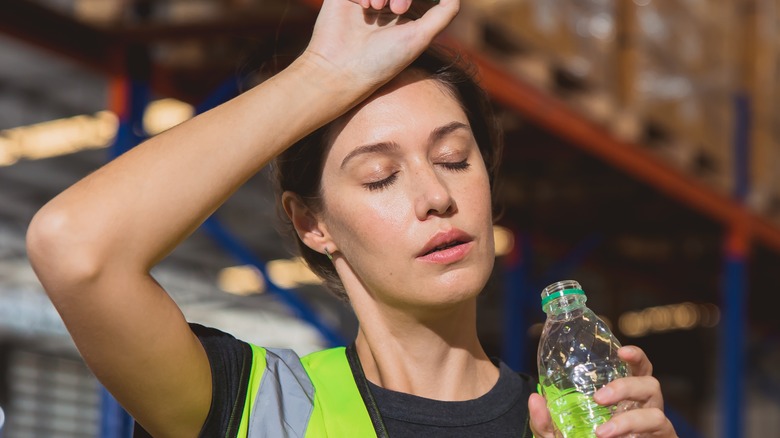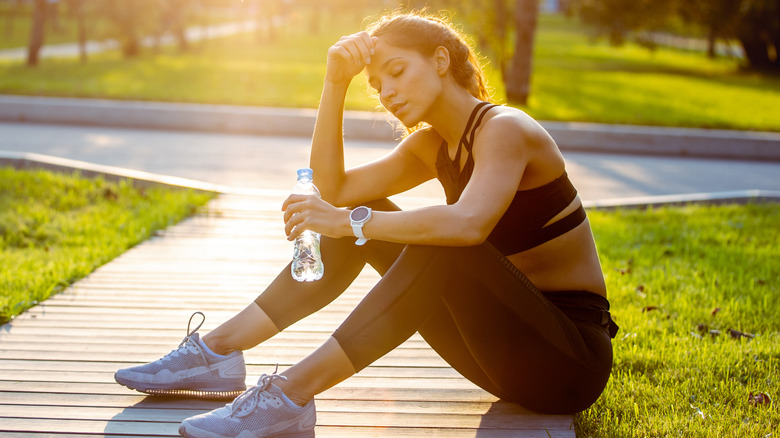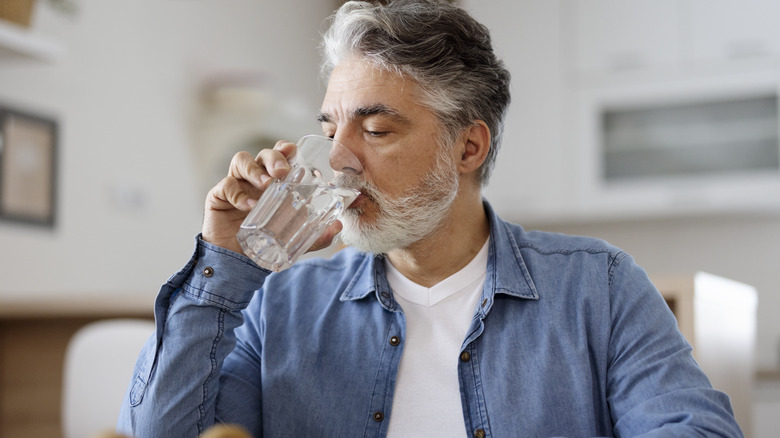What Happens To Your Kidneys When You Don't Drink Enough Water
Even if you're starving, your body can sustain itself without food for several weeks, according to Better Health Channel. Your thirst is something different. Your body can't last longer than a few days without water. Water brings moisture to your skin and mucous membranes, and it provides cushioning to your joints. Your digestive system needs water to shuttle nutrients through your gut. When your body is overheated, water helps cool it through sweating. Your kidneys need water to rid the body of excess electrolytes, urea, and waste from metabolic processes.
Although your body can hold water, you must continually replenish your system with water every day. Hot and dry conditions usually cause you to lose water. Typically, in the summer, you lose much of your water through sweat, but the dry heat that warms your home in the winter also robs you of your hydration (per Kidney Research UK).
You also lose water through bodily functions such as bowel movements, breathing, and urine. If you don't drink enough water, your urine becomes more concentrated with minerals and waste products. Eventually, crystals can develop and form kidney stones (per Panoramic Health).
How dehydration can damage your kidneys
Your kidneys filter out waste and excess minerals from your blood and send them out of your body through urine. Your kidneys also regulate your electrolyte levels, fluid levels, blood pressure, and red blood cell production. For your kidneys to do their work, you need water. Even though your body consists of about 60% water, your kidneys are almost 80% water.
These kidney stones can damage your body when they move through your urinary system. Some can't pass through and can cause pain or infection. Not having enough water in your body can also cause the buildup of muscle proteins in the kidneys. Drinking enough water helps flush excess sodium and waste to keep your kidneys healthy.
You might notice symptoms of dehydration, such as muscle cramps, headaches, or fatigue, but your kidneys can also tell you if you're not drinking enough water. If the color of your urine is dark and has a strong odor, you might need to drink some fluids (per Panoramic Health).
How to stay hydrated
While a good estimate of your daily hydration needs is about eight cups, you might need more or less depending on your diet and your lifestyle. Men might need up to 16 cups a day, and women could require up to 12 cups. People who exercise lose a lot of water through their sweat during a workout. Rather than guzzle a ton of water after a workout, it's a good idea to drink some fluid before, during, and after exercising. Your thirst is usually a good indicator that you might need some fluids, but you're probably drinking enough if your urine is pale yellow (per Mayo Clinic).
If you don't like water, you can still stay hydrated with certain foods. Fruits like strawberries and melons also have high water content (per UCLA Health). Cucumbers, iceberg lettuce, and celery all have a ton of water in them to meet your hydration needs. Rather than use pasta, swap for zucchini noodles to lower your carbs and boost your hydration. You can start your day with a cup of water when you cook half a cup of oatmeal, and hot soup on a cold day can also increase your fluid levels. Milk is also hydrating because it's 87% water (per MedExpress).



